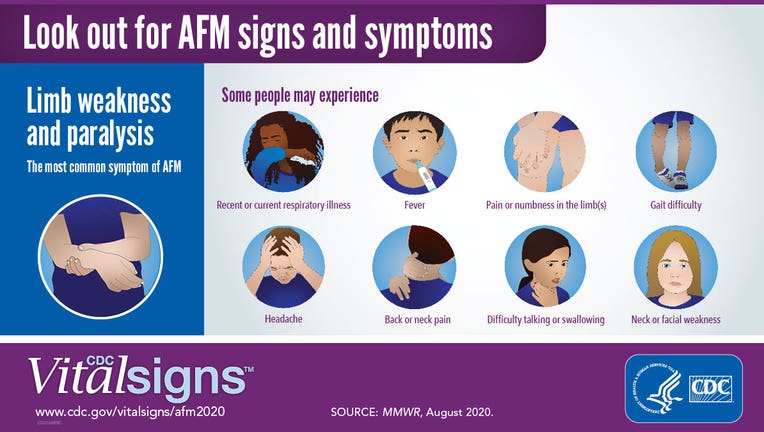CDC warns of life-threatening disease that can paralyze healthy children

(CDC)
NEW YORK - The Centers for Disease Control and Prevention (CDC) anticipates that 2020 will be another peak year for cases of acute flaccid myelitis (AFM), an uncommon but serious neurologic condition that affects mostly children.
The disease has peaked every two years between August and November in the United States since 2014. Enteroviruses, particularly enterovirus-D68 (EV-D68), are likely responsible for these peaks in cases.
CDC released a new CDC Vital Signs report to alert health care providers to a possible outbreak this year.
The report reveals a delay in care for some patients in 2018: 35% of patients were not hospitalized until two or more days after limb weakness. AFM can progress rapidly over the course of hours or days, leading to permanent paralysis and/or the life-threatening complication of respiratory failure in previously healthy patients, so delays in care can be serious.
Parents and doctors should suspect AFM in patients with sudden limb weakness, especially during August through November. Recent respiratory illness or fever and the presence of neck or back pain or any neurologic symptom should heighten their concern.
Pediatricians and frontline providers in emergency departments and urgent care centers should be prepared to quickly recognize symptoms of AFM and immediately hospitalize patients. Timing is critical at each step—prompt AFM recognition leads to optimal medical management and early specimen collection.
When health care providers recognize symptoms as soon as possible, there is a better chance of detecting the cause of AFM, which might help predict the outcome. Other laboratory tests and an MRI of the brain and spinal cord can distinguish AFM from other conditions with limb weakness.
It is not known how the COVID-19 pandemic and the social distancing measures may affect the circulation of viruses that can cause AFM, or if COVID-19 will impact the health care system’s ability to promptly recognize and respond to AFM.
If social distancing measures decrease the circulation of enteroviruses this year, AFM cases may be fewer than expected or the outbreak may be delayed.
The third and largest peak of AFM occurred in 2018, with 238 cases in 42 states.

